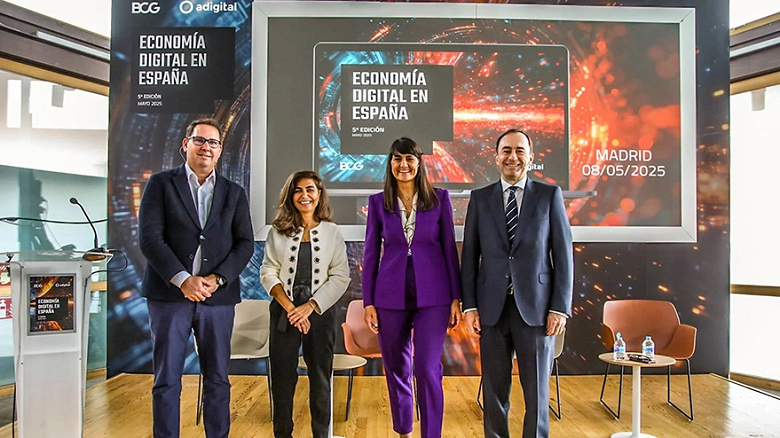Digital economy consolidates role in Spanish production model

It reached 26% of Gross Domestic Product in 2024, with an economic impact in absolute terms of 414 billion euros.
According to the fifth edition of the Digital Economy in Spain report, prepared by the Spanish Digital Economy Association (Adigital) and Boston Consulting Group (BCG), the digital economy, which includes all economic activities based on digital goods and services, reached 26% of Spanish Gross Domestic Product in 2024.
This is up 1.8% from the 24.2% recorded in 2023, and over 7% more than the 18.7% included in the first edition in 2019. The economic impact of the digital economy last year amounted to 414 billion euros in absolute terms, a year-on-year growth of 17% that far outstripped nominal Gross Domestic Product growth of 6.3%. According to the authors of the report, which analyses the evolution of digitalisation in Spain, these figures consolidate the transformation of the Spanish production model.
Direct impact
The report specifies that the 26% of Gross Domestic Product attributed to the digital economy is divided into three components: the direct impact generated by digitalised industries (12.9%), the indirect impact due to the drag effect on suppliers and supply chains (12.3%), and the induced impact, which refers to the increase in consumption derived from higher-income workers in digitalised industries (0.8%).
The report pays special attention to artificial intelligence from two points of view: public AI, as a strategic component of the country’s digital infrastructure, and responsible AI as a driver of competitiveness for the business world, which still has limited adoption in SMEs.
Strategic autonomy
The authors believe that public AI has the potential to drive efficient and universal services, democratise access to advanced technologies and contribute to strategic autonomy. In this respect, Spain has a solid base, with 143 data centres, high-speed networks in 94% of households and 83% use of e-administration, i.e. digital access to public services.
According to the Iberia Chair of Boston Consulting Group (BCG), Rafael Rilo, “the advance of the digital economy in Spain not only confirms a sustained trend, but also demonstrates that digitalisation is a structural driver of growth”. The Spanish Secretary of State for Digitalisation and Artificial Intelligence, María González Veracruz, described it as “a very relevant indicator of the structural progress that Spain is making in its digital transformation”.
Adigital CEO César Tello concluded, “Businesses need tailored frameworks to benefit from the potential of artificial intelligence. At Adigital, we are committed to useful, usable and responsible AI, supported by strategy, data culture and talent. Only in this way will we be able to achieve a progressive and sustainable adoption that will allow the business world to grow with confidence and have a real impact on its environment.”
Photo: Adigital




